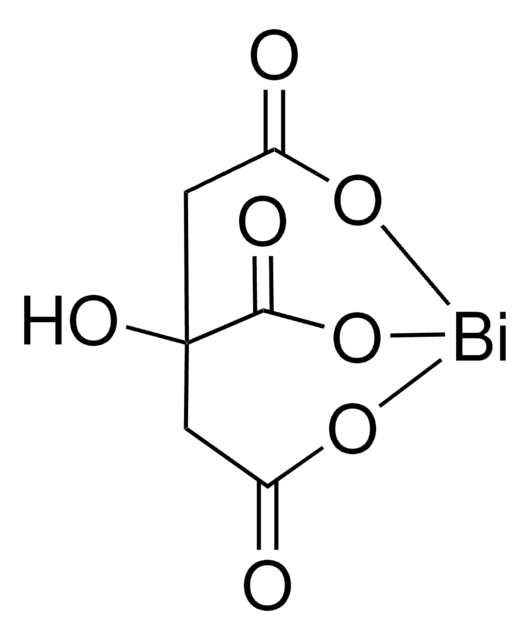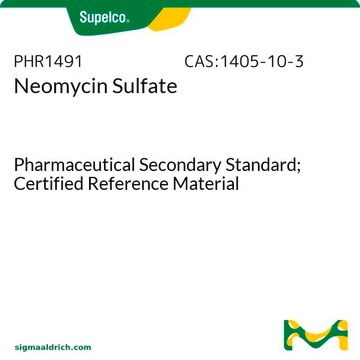480789
Bismuth(III) subsalicylate
99.9% trace metals basis
Synonym(s):
Bismuth oxysalicylate, Bismuth subsalicylate, Bismuth(III) salicylate basic
About This Item
Recommended Products
Quality Level
Assay
99.9% trace metals basis
reaction suitability
core: bismuth
reagent type: catalyst
mp
>350 °C (lit.)
SMILES string
O[Bi]1OC(=O)c2ccccc2O1
InChI
1S/C7H6O3.Bi.H2O/c8-6-4-2-1-3-5(6)7(9)10;;/h1-4,8H,(H,9,10);;1H2/q;+3;/p-3
InChI key
ZREIPSZUJIFJNP-UHFFFAOYSA-K
General description
Application
- Use of ferric chloride to identify salicylate-containing poisons.: This study explores the use of ferric chloride to detect salicylate compounds, including Bismuth subsalicylate, highlighting its significance in toxicological screenings and emergency treatments. (Hoffman RJ et al., 2002).
- Effect of pepper and bismuth subsalicylate on gastric pain and surface hydrophobicity in the rat.: Investigates the effects of Bismuth subsalicylate on gastric pain and stomach lining properties, providing insights into its gastroprotective mechanisms. (Lichtenberger LM et al., 1998).
- The coccoid forms of Helicobacter pylori. Criteria for their viability.: Examines the effectiveness of Bismuth subsalicylate in targeting different morphological forms of Helicobacter pylori, contributing to its role in eradication therapies. (Bode G et al., 1993).
- Bismuth therapy in gastrointestinal diseases.: A comprehensive review of the therapeutic applications of Bismuth subsalicylate in treating various gastrointestinal disorders, underscoring its pharmacological benefits and safety profile. (Gorbach SL, 1990).
Storage Class Code
11 - Combustible Solids
WGK
WGK 3
Flash Point(F)
Not applicable
Flash Point(C)
Not applicable
Personal Protective Equipment
Certificates of Analysis (COA)
Search for Certificates of Analysis (COA) by entering the products Lot/Batch Number. Lot and Batch Numbers can be found on a product’s label following the words ‘Lot’ or ‘Batch’.
Already Own This Product?
Find documentation for the products that you have recently purchased in the Document Library.
Customers Also Viewed
Our team of scientists has experience in all areas of research including Life Science, Material Science, Chemical Synthesis, Chromatography, Analytical and many others.
Contact Technical Service










